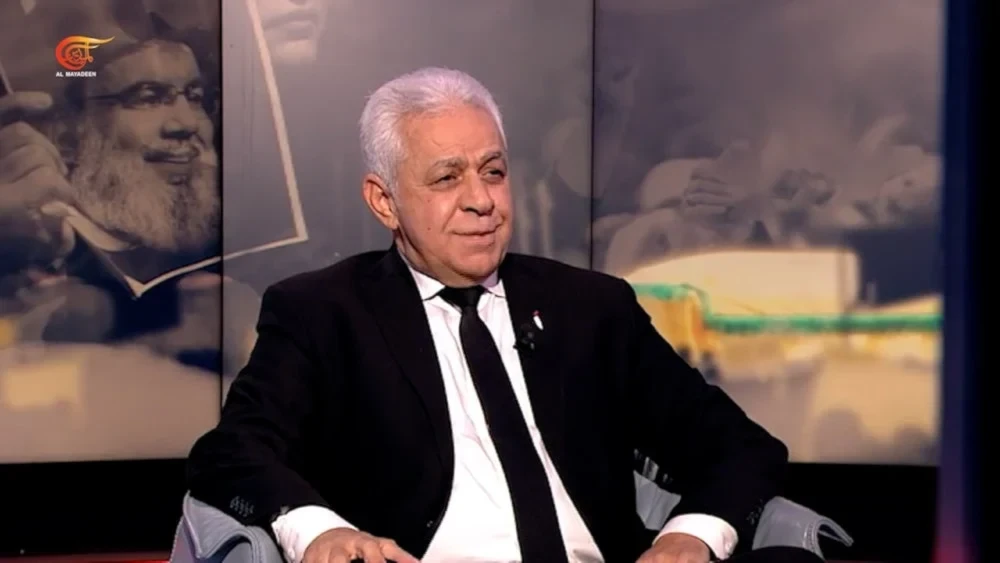Sayyed Nasrallah led Ummah to liberate land, achieve victories: Sabahi
Secretary-General of the Arab National Conference says martyr Sayyed Hassan Nasrallah was the pillar of the Axis of Resistance.
-

Hamdeen Sabahi, Secretary-General of the Arab National Conference, speaking with Al Mayadeen, on Tuesday, February 18, 2025 (Screengrab)
As part of its special coverage titled "Sayyed of the Ummah," or "Master of the Islamic Nations," Al Mayadeen hosted Hamdeen Sabahi, secretary-general of the Arab National Conference, who spoke about martyr Sayyed Hassan Nasrallah, the former secretary-general of Hezbollah, and his impact on the region.
Sabahi asserted that martyr Sayyed Nasrallah was the pillar of the Axis of Resistance, noting that his absence is deeply felt and that filling the void he left will take time.
The Egyptian politician credited Sayyed Nasrallah with enabling the Ummah to "possess a deterrent force against its enemy, liberate its land, and achieve victories." He further highlighted the late Lebanese Resistance leader's unwavering determination to confront "Zionist and American tyranny."
According to Sabahi, Sayyed Nasrallah "understood the nature of the expansionist colonial enemy and recognized that displacement is one of the mechanisms adopted by this aggressive project."
He emphasized that Sayyed Nasrallah "presented the most remarkable model of post-conventional warfare" since 1973.
He stated that "the nation chose Sayyed Nasrallah, and his leadership was a profound act of devotion linked to a man who became a symbol."
The politician added that "he will remain as long as the Arab people endure, as long as dignity is cherished, and as long as his path is followed until Palestine is liberated."
Egypt and Sayyed Nasrallah
Regarding Egypt’s relationship with Sayyed Nasrallah, Sabahi noted that "Egypt loved him deeply," pointing out that he was among the few whose image was raised in Egyptian squares and at al-Azhar Mosque after 2006. Meanwhile, according to Sabahi, "Egypt held a profound place in the heart, mind, and consciousness of the martyred Sayyed Nasrallah, and he expressed this sentiment on numerous occasions."
He further recalled that the Ummah rallied around Sayyed Nasrallah, with his image raised everywhere following the great victory in 2006.
"The enemies of Egypt are the same ones Sayyed Hassan Nasrallah confronted, as there is no greater enemy to Egypt than the Zionist enemy," Sabahi stressed.
Touching on developments in Gaza after the war, the secretary-general of the Arab National Conference praised Egypt’s official stance in rejecting the displacement of Palestinians, calling for national unity around this position.
Common ground with Abdel Nasser
Sabahi also drew parallels between martyr Sayyed Nasrallah and late Egyptian leader Gamal Abdel Nasser, stating that their shared commitment to Palestine was a defining similarity.
"The banner raised by Abdel Nasser is the same one carried by Sayyed Nasrallah—the banner of Palestine’s liberation," he said.
The Egyptian politician affirmed that the connection between Arabism and Islam is inseparable, a principle clearly reflected in the thoughts and experiences of both Abdel Nasser and Sayyed Nasrallah.
"Like Abdel Nasser, Sayyed Nasrallah was deeply committed to the poor, the marginalized, and the oppressed," he concluded.
Read more: Exclusive: Sayyed Nasrallah was a compassionate, unique leader - Safa

 3 Min Read
3 Min Read










